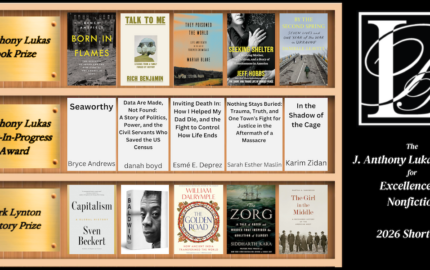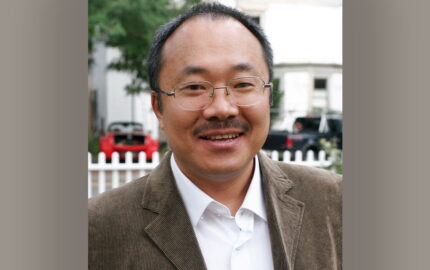CAMBRIDGE, Mass. – The Chicago Tribune has won the Taylor Family Award for Fairness in Newspapers for “Clout Goes to College,” its evenhanded and thorough investigation of improper influence peddling in the admissions process at the University of Illinois.
Two finalists were also selected for the award: The Wall Street Journal for “Hearts, Minds and Blood: The Battle for Iran,” a collection of reports by Farnaz Fassihi that examine the harsh government crackdown on protesters in Iran, and The News & Observer in Raleigh, N.C., for “Executive Privilege: The Perks of Power,” a series led by investigative reporter J. Andrew Curliss about the legal and ethical problems surrounding former North Carolina Gov. Mike Easley and his associates at N.C. State University.
In “Clout Goes to College,” the Chicago Tribune revealed that lawmakers and university trustees used their sway to help subpar applicants gain admission to the University of Illinois, at times over the objections of admissions officers. The paper exposed secret admissions clout lists and a corrupt admissions process and in doing so, paved the way for reforms including a new admissions system, a new university president and chancellor, and six new members of the university’s Board of Trustees.
Over the course of five months, the paper published about 90 stories and developed two online databases that showed readers what role their local high schools and legislators played in the scandal. Reporters Jodi S. Cohen, Stacy St. Clair, Tara Malone and Robert Becker worked with editor Tracy Van Moorlehem and graphic artist Keith Claxton to produce the series.
Taylor Award judge Ames Alexander commented “Fairness was both the means and the end of this investigation. The newspaper let University of Illinois officials speak for themselves at length, publishing e-mails that spoke volumes about the tainted admissions process. But while the Tribune pounded the power-brokers and university officials who had corrupted the admissions system, it sought to protect “clouted” students who weren’t demonstrably culpable. The staff’s dogged and conscientious efforts produced a remarkable result: An unjust student selection process was replaced with one based on merit.”
Another judge, Monica Campbell said “The idea that political favoritism exists in the university admissions process is not new. But in a nuanced and comprehensive way, this series shows how a university system can allow for such corruption and drives that angle, rather than merely calling out the culprits, in a way that usefully shows how power and undue pressures wind their way through a university’s bureaucracy. Taken together, with informative graphics, reproduced e-mails and sidebars, the series offers a precise case study on deal-making at universities—not just at the U. of Illinois, but what may likely exist at other institutions—and fairly portrays the culture that allows such problems to exist.”
The Taylor Award judges also recognized two finalists:
The Wall Street Journal for “Hearts, Minds and Blood: The Battle for Iran”
In this series of articles, reporter Farnaz Fassihi covered the violent government crackdown on protestors in Iran following the country’s presidential election last June. As the Journal’s Senior Deputy Managing Editor Michael Miller wrote in his nomination letter, “At great personal risk to herself and her family in Iran, Ms. Fassihi provided readers of The Wall Street Journal with the most authoritative, compelling and insightful coverage of the Iranian resistance and the attempts to quash it.” He added, “Her achievement is all the more extraordinary given the paranoia of the Iranian regime and its hostility toward her personally.” Fassihi was assisted in her reporting by editors Jesse Pesta and Chip Cummins, Deputy Managing Editor Michael Williams and Steve Stecklow, senior special writer.
Judge Anita Snow noted that Fassihi’s stories “demonstrate a level of sophistication and fairness uncommon in international reportage during violent times. In Iran’s politically charged environment around last year’s national elections, it would have been easy for the reporter to fall into facile stereotypes about the protesters and the anti-government supporters who persecuted them. Instead, Fassihi analyzes and shows readers many different faces of Iranian society…This is extraordinary international reportage, delivered in a compelling way through three-dimensional people.”
Judge Monica Campbell added, “Because she pursued less accessible voices, namely the pro-government henchman, while also providing nuanced coverage of more behind-the-scenes protesters, I consider Farnaz Fassihi’s reporting from Iran in 2009 worthy of the Taylor Family Award for Fairness in Newspapers. Besides her rich and clear writing, it is clear that Fassihi acknowledges the importance of having sources from many sides.”
The News & Observer in Raleigh, N.C. for “Executive Privilege: The Perks of Power”
This series follows the misdeeds of former North Carolina Gov. Mike Easley and some of his associates and the legal ramifications of their actions. The coverage has spurred state and federal investigations that have found wrongdoing and led to the resignations or firing of several high officials, including the chancellor at N.C. State University. Investigative reporter J. Andrew Curliss produced the series along with Steve Riley, senior editor/investigations; Jay Price, staff writer; and Steve Merelman, Page One editor.
Judge Ames Alexander observed, “From the reporting to the writing, and from the headlines to the graphics, the staff of the Raleigh News & Observer deserves kudos for the fairness, courage and tenacity of their investigation into influence peddling at the highest levels of North Carolina government. Reporter Andy Curliss went to extraordinary lengths to get the subjects of his investigation to talk. Undaunted by weeks of unanswered phone calls and e-mail messages, Curliss approached key officials at social functions. He chased after the lawyer of an indicted gubernatorial aide in downtown Raleigh. And after researching the musical tastes of university provost Larry Nielsen, he quoted from a song in “Chicago” to encourage him to speak. Meticulous in its research and documentation, the newspaper always took the high road.”
Taylor judge Mike Pride added, “This political exposé was a textbook example of investigative journalism. J. Andrew Curliss saw favors being done in high places and open-government laws being skirted. He worked hard to get the documents that would make his case. He gave the people involved every opportunity to tell their side of the story. His careful reporting brought about good results for his readers and other residents of North Carolina. But what set this entry apart for me was the News & Observer’s effort to give the contest judges a look under the hood. What we saw in the e-mails and other supporting documents was just how fair – and persistent – Curliss was in pursuing his story and defending his reporting from the slings and arrows of difficult subjects.”
In making their selections, the Taylor Award judges identified stories that they believe met the highest standards of fairness in all aspects of the journalistic process: reporting, writing, editing, headlines, photographs, illustrations and presentation.
The judges for this year’s Taylor Award were Ames Alexander, an investigative reporter for The Charlotte Observer who together with several colleagues was winner of last year’s Taylor Award for their series “The Cruelest Cuts”; Monica Campbell, a freelance journalist who covers Mexico for national news publications and a 2010 Nieman Fellow; Mike Pride, editor emeritus of the Concord (N.H.) Monitor and a 1985 Nieman Fellow; and Anita Snow, former AP bureau chief in Havana and a 2010 Nieman Fellow. Nieman Foundation Curator Bob Giles served as jury chair.
The Taylor Award ceremony will be held on April 8, 2010 at the Nieman Foundation for Journalism at Harvard in Cambridge, Mass. The Taylor honor includes a $10,000 prize for the winner and $1,000 each for the two top finalists. The award program was established through gifts for an endowment by members of the Taylor family, who published The Boston Globe from 1872 to 1999. The purpose of the award is to encourage fairness in news coverage by America’s daily newspapers.
William O. Taylor, chairman emeritus of the Globe, embraced the idea of an award for fairness in newspapers as a way to give something back to the craft to which five generations of his family devoted their working lives. For more than a century, the Taylor family’s stewardship of the Globe was characterized by an enduring commitment to fairness. At his invitation, the Nieman Foundation for Journalism at Harvard agreed to administer the prize starting in 2002.
The Nieman Foundation for Journalism at Harvard administers the oldest midcareer fellowship program for journalists in the world. The fellowships are awarded to working journalists of accomplishment and promise who travel to Harvard University for a year of study, seminars and special events. Since 1938, more than 1,300 journalists from 89 countries have received Nieman Fellowships. The Nieman Foundation also publishes the quarterly magazine Nieman Reports, the nation’s oldest magazine devoted to a critical examination of the practice of journalism, and is home to the Nieman Journalism Lab, which identifies emerging business models and best practices in journalism in the digital media age. Additionally, the foundation produces the Nieman Narrative Digest and Nieman Storyboard, two Web sites that showcase exceptional narrative journalism, and the Nieman Watchdog Project, a Web site that encourages journalists to monitor and hold accountable all those who exert power in public life.
Two finalists were also selected for the award: The Wall Street Journal for “Hearts, Minds and Blood: The Battle for Iran,” a collection of reports by Farnaz Fassihi that examine the harsh government crackdown on protesters in Iran, and The News & Observer in Raleigh, N.C., for “Executive Privilege: The Perks of Power,” a series led by investigative reporter J. Andrew Curliss about the legal and ethical problems surrounding former North Carolina Gov. Mike Easley and his associates at N.C. State University.
In “Clout Goes to College,” the Chicago Tribune revealed that lawmakers and university trustees used their sway to help subpar applicants gain admission to the University of Illinois, at times over the objections of admissions officers. The paper exposed secret admissions clout lists and a corrupt admissions process and in doing so, paved the way for reforms including a new admissions system, a new university president and chancellor, and six new members of the university’s Board of Trustees.
Over the course of five months, the paper published about 90 stories and developed two online databases that showed readers what role their local high schools and legislators played in the scandal. Reporters Jodi S. Cohen, Stacy St. Clair, Tara Malone and Robert Becker worked with editor Tracy Van Moorlehem and graphic artist Keith Claxton to produce the series.
Taylor Award judge Ames Alexander commented “Fairness was both the means and the end of this investigation. The newspaper let University of Illinois officials speak for themselves at length, publishing e-mails that spoke volumes about the tainted admissions process. But while the Tribune pounded the power-brokers and university officials who had corrupted the admissions system, it sought to protect “clouted” students who weren’t demonstrably culpable. The staff’s dogged and conscientious efforts produced a remarkable result: An unjust student selection process was replaced with one based on merit.”
Another judge, Monica Campbell said “The idea that political favoritism exists in the university admissions process is not new. But in a nuanced and comprehensive way, this series shows how a university system can allow for such corruption and drives that angle, rather than merely calling out the culprits, in a way that usefully shows how power and undue pressures wind their way through a university’s bureaucracy. Taken together, with informative graphics, reproduced e-mails and sidebars, the series offers a precise case study on deal-making at universities—not just at the U. of Illinois, but what may likely exist at other institutions—and fairly portrays the culture that allows such problems to exist.”
The Taylor Award judges also recognized two finalists:
The Wall Street Journal for “Hearts, Minds and Blood: The Battle for Iran”
In this series of articles, reporter Farnaz Fassihi covered the violent government crackdown on protestors in Iran following the country’s presidential election last June. As the Journal’s Senior Deputy Managing Editor Michael Miller wrote in his nomination letter, “At great personal risk to herself and her family in Iran, Ms. Fassihi provided readers of The Wall Street Journal with the most authoritative, compelling and insightful coverage of the Iranian resistance and the attempts to quash it.” He added, “Her achievement is all the more extraordinary given the paranoia of the Iranian regime and its hostility toward her personally.” Fassihi was assisted in her reporting by editors Jesse Pesta and Chip Cummins, Deputy Managing Editor Michael Williams and Steve Stecklow, senior special writer.
Judge Anita Snow noted that Fassihi’s stories “demonstrate a level of sophistication and fairness uncommon in international reportage during violent times. In Iran’s politically charged environment around last year’s national elections, it would have been easy for the reporter to fall into facile stereotypes about the protesters and the anti-government supporters who persecuted them. Instead, Fassihi analyzes and shows readers many different faces of Iranian society…This is extraordinary international reportage, delivered in a compelling way through three-dimensional people.”
Judge Monica Campbell added, “Because she pursued less accessible voices, namely the pro-government henchman, while also providing nuanced coverage of more behind-the-scenes protesters, I consider Farnaz Fassihi’s reporting from Iran in 2009 worthy of the Taylor Family Award for Fairness in Newspapers. Besides her rich and clear writing, it is clear that Fassihi acknowledges the importance of having sources from many sides.”
The News & Observer in Raleigh, N.C. for “Executive Privilege: The Perks of Power”
This series follows the misdeeds of former North Carolina Gov. Mike Easley and some of his associates and the legal ramifications of their actions. The coverage has spurred state and federal investigations that have found wrongdoing and led to the resignations or firing of several high officials, including the chancellor at N.C. State University. Investigative reporter J. Andrew Curliss produced the series along with Steve Riley, senior editor/investigations; Jay Price, staff writer; and Steve Merelman, Page One editor.
Judge Ames Alexander observed, “From the reporting to the writing, and from the headlines to the graphics, the staff of the Raleigh News & Observer deserves kudos for the fairness, courage and tenacity of their investigation into influence peddling at the highest levels of North Carolina government. Reporter Andy Curliss went to extraordinary lengths to get the subjects of his investigation to talk. Undaunted by weeks of unanswered phone calls and e-mail messages, Curliss approached key officials at social functions. He chased after the lawyer of an indicted gubernatorial aide in downtown Raleigh. And after researching the musical tastes of university provost Larry Nielsen, he quoted from a song in “Chicago” to encourage him to speak. Meticulous in its research and documentation, the newspaper always took the high road.”
Taylor judge Mike Pride added, “This political exposé was a textbook example of investigative journalism. J. Andrew Curliss saw favors being done in high places and open-government laws being skirted. He worked hard to get the documents that would make his case. He gave the people involved every opportunity to tell their side of the story. His careful reporting brought about good results for his readers and other residents of North Carolina. But what set this entry apart for me was the News & Observer’s effort to give the contest judges a look under the hood. What we saw in the e-mails and other supporting documents was just how fair – and persistent – Curliss was in pursuing his story and defending his reporting from the slings and arrows of difficult subjects.”
In making their selections, the Taylor Award judges identified stories that they believe met the highest standards of fairness in all aspects of the journalistic process: reporting, writing, editing, headlines, photographs, illustrations and presentation.
The judges for this year’s Taylor Award were Ames Alexander, an investigative reporter for The Charlotte Observer who together with several colleagues was winner of last year’s Taylor Award for their series “The Cruelest Cuts”; Monica Campbell, a freelance journalist who covers Mexico for national news publications and a 2010 Nieman Fellow; Mike Pride, editor emeritus of the Concord (N.H.) Monitor and a 1985 Nieman Fellow; and Anita Snow, former AP bureau chief in Havana and a 2010 Nieman Fellow. Nieman Foundation Curator Bob Giles served as jury chair.
The Taylor Award ceremony will be held on April 8, 2010 at the Nieman Foundation for Journalism at Harvard in Cambridge, Mass. The Taylor honor includes a $10,000 prize for the winner and $1,000 each for the two top finalists. The award program was established through gifts for an endowment by members of the Taylor family, who published The Boston Globe from 1872 to 1999. The purpose of the award is to encourage fairness in news coverage by America’s daily newspapers.
William O. Taylor, chairman emeritus of the Globe, embraced the idea of an award for fairness in newspapers as a way to give something back to the craft to which five generations of his family devoted their working lives. For more than a century, the Taylor family’s stewardship of the Globe was characterized by an enduring commitment to fairness. At his invitation, the Nieman Foundation for Journalism at Harvard agreed to administer the prize starting in 2002.
The Nieman Foundation for Journalism at Harvard administers the oldest midcareer fellowship program for journalists in the world. The fellowships are awarded to working journalists of accomplishment and promise who travel to Harvard University for a year of study, seminars and special events. Since 1938, more than 1,300 journalists from 89 countries have received Nieman Fellowships. The Nieman Foundation also publishes the quarterly magazine Nieman Reports, the nation’s oldest magazine devoted to a critical examination of the practice of journalism, and is home to the Nieman Journalism Lab, which identifies emerging business models and best practices in journalism in the digital media age. Additionally, the foundation produces the Nieman Narrative Digest and Nieman Storyboard, two Web sites that showcase exceptional narrative journalism, and the Nieman Watchdog Project, a Web site that encourages journalists to monitor and hold accountable all those who exert power in public life.


